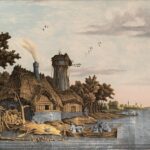Fathers and Sons by Ivan Turgenev is a classic Russian novel that delves into the complexities of generational conflict, social change, and the clash between traditional values and emerging ideologies. Published in 1862, the novel has since become a celebrated work of Russian literature, known for its insightful portrayal of characters and its exploration of broader social and philosophical themes. In this article, we will provide a detailed analysis of the novel, examining its plot, characters, themes, writing style, setting, historical context, and impact on literature.
Plot and Storyline
Fathers and Sons is set in mid-19th century Russia and revolves around the relationships and conflicts between two generations: the older, conservative fathers and the younger, progressive sons. The central story arc follows the protagonist, Yevgeny Bazarov, a nihilistic medical student, and his friend Arkady Kirsanov, as they visit Arkady’s family estate during a summer break from university. The novel explores their interactions with the Kirsanov family, particularly the patriarch, Nikolai Kirsanov, and his brother, Pavel Petrovich.
The arrival of Bazarov, an ardent proponent of nihilism and radical ideas, disrupts the tranquil existence of the Kirsanov household. Bazarov’s nihilistic beliefs reject traditional values, authority, and societal norms, causing tension between him and the conservative characters. As the story progresses, Bazarov forms a romantic relationship with Anna Sergeyevna Odintsova, a wealthy and independent woman. However, their relationship is complicated by their differing ideologies and personal ambitions.
Several key events shape the narrative, including Bazarov’s clash with Pavel, his growing disillusionment with his own nihilistic beliefs, and the tragic consequences of his actions. The novel reaches its climax when Bazarov falls ill with typhus during a medical expedition and returns to the Kirsanov estate to seek refuge. Despite receiving care from the Kirsanov family, Bazarov’s condition worsens, and he succumbs to his illness. His death deeply affects the characters, prompting introspection and reflection on the nature of life, love, and the generation gap.
Characters
Fathers and Sons features a cast of well-developed characters, each representing different ideologies and perspectives. Yevgeny Bazarov, the novel’s central character, is a complex figure embodying the nihilistic philosophy. He is portrayed as an intelligent and confident individual, driven by his scientific pursuits and disdain for societal conventions. Throughout the novel, Bazarov undergoes personal growth and experiences moments of self-doubt, ultimately challenging his own beliefs.
Arkady Kirsanov, Bazarov’s friend, serves as a bridge between the older and younger generations. He initially idolizes Bazarov and adopts his nihilistic views but later questions the consequences of these beliefs. Arkady’s journey reflects the struggle to find one’s identity amidst conflicting ideologies and familial expectations.
Nikolai Kirsanov, Arkady’s father, represents the older generation of landowners and embodies traditional Russian values. He is depicted as a kind-hearted and generous man, but his inability to adapt to changing times and his strained relationship with his son highlight the generational divide.
Pavel Petrovich, Nikolai’s brother, is a refined and cultured aristocrat who embodies the fading era of Russian nobility. Pavel’s clashes with Bazarov reveal the tension between the old and new ideologies and the underlying conflicts within society.
Anna Sergeyevna Odintsova, a wealthy widow, represents the strong, independent woman in the novel. Her relationship with Bazarov showcases the complexity of love and the clash between personal desires and societal expectations.
Themes and Symbols
Fathers and Sons explores several themes that resonate throughout the narrative. One prominent theme is the generational conflict between fathers and sons. Turgenev portrays the clash between tradition and progress, highlighting the challenges faced by the younger generation as they seek to redefine societal norms and challenge the authority of their elders.
Another significant theme is the exploration of nihilism and its consequences. Bazarov’s character serves as a representation of nihilistic ideas, and the novel examines the flaws and limitations of this philosophy. Turgenev suggests that blindly rejecting societal values and traditions can lead to disillusionment and a lack of purpose.
Love and relationships are also central themes in the novel. Turgenev explores the complexities of romantic and familial love, as characters navigate their desires, societal expectations, and personal growth. The relationships between Bazarov and Anna, as well as the strained father-son dynamics, highlight the challenges of finding genuine connections amidst societal pressures.
Symbols play a significant role in enhancing the novel’s thematic depth. The cherry orchard, for example, represents the fading world of the Russian aristocracy and the passing of an era. The orchard’s destruction serves as a metaphor for the societal changes and upheaval faced by the characters.
Writing Style
Turgenev’s writing style in Fathers and Sons is characterized by its clarity, realism, and psychological depth. He employs a straightforward narrative structure, allowing readers to engage directly with the characters and their internal struggles. Turgenev’s prose is elegant and concise, conveying complex emotions and ideas with precision.
The author masterfully uses dialogueto reveal the inner thoughts and conflicts of the characters, creating a sense of authenticity and depth. Through their conversations, Turgenev explores the clash of ideologies and the complexities of human relationships, providing insight into the motivations and beliefs of each character.
Turgenev also employs various literary techniques to enhance the reader’s experience. For instance, he uses irony and satire to critique the societal norms and ideologies of the time. The juxtaposition of Bazarov’s radical ideas with the more traditional values of the older generation creates a sense of tension and irony throughout the novel.
The author’s vivid descriptions of nature and the Russian countryside contribute to the overall atmosphere of the story. The natural world serves as a backdrop for the characters’ experiences and emotions, reflecting their inner turmoil and the changing social landscape.
Setting and Atmosphere
The setting of Fathers and Sons is significant in shaping the novel’s tone and atmosphere. The story takes place in rural Russia, primarily on the Kirsanov family estate. The depiction of the countryside, with its vast landscapes and serene beauty, creates a sense of tranquility and nostalgia. At the same time, it serves as a reflection of the characters’ internal conflicts and the changing social order.
The time period in which the novel is set, the mid-19th century, is a critical backdrop for the narrative. Russia was undergoing significant social and political changes during this period, with the rise of revolutionary ideologies and the decline of the traditional aristocracy. Turgenev explores this context, highlighting the tension between the old and the new, and the challenges faced by individuals navigating these shifting social dynamics.
The atmosphere of the novel is often melancholic, reflecting the characters’ struggles and the broader themes of disillusionment and loss. Turgenev’s evocative descriptions and the introspective nature of the narrative contribute to this pervasive sense of longing and introspection.
Historical, Social, or Political Context
Fathers and Sons was written and set during a time of great social and political change in Russia. The mid-19th century marked the decline of the Russian serf system and the rise of revolutionary ideas. Turgenev, himself a member of the Russian aristocracy, was deeply influenced by these societal shifts and the intellectual debates of the time.
The novel provides a critical examination of the changing social order and the clash between traditionalism and progressivism. Turgenev explores the impact of these changes on individuals and their relationships, shedding light on the complexities of navigating a society in transition.
Fathers and Sons can be seen as a commentary on the broader historical context of Russia during the 19th century. It reflects the tensions and conflicts present in Russian society at the time, offering insights into the intellectual and ideological debates that shaped the country’s future.
Impact and Reception
Fathers and Sons had a significant impact on Russian literature and continues to be regarded as one of Turgenev’s most influential works. It was met with both acclaim and controversy upon its publication, as it challenged traditional beliefs and sparked debates about the generation gap and societal change.
The novel’s realistic portrayal of characters and their psychological depth set a new standard for character development in Russian literature. Turgenev’s exploration of the generational conflict and his nuanced depiction of the complexities of human relationships influenced subsequent generations of writers.
Fathers and Sons sparked intense discussions about the role of nihilism and the clash between tradition and progress. It became a touchstone for examining the intellectual currents of the time and the broader social and political context in which the novel was written.
In conclusion, Fathers and Sons by Ivan Turgenev is a thought-provoking novel that delves into the complexities of generational conflict, societal change, and the search for personal identity. Through its well-developed characters, exploration of themes, and skillful writing style, Turgenev offers a profound commentary on the human condition and the challenges of navigating a changing world. Fathers and Sons remains a significant work in Russian literature, its impact resonating with readers and scholars alike, and its enduring themes continuing to be relevant in contemporary society.
Sources
Fathers and Sons (novel) – Wikipedia






